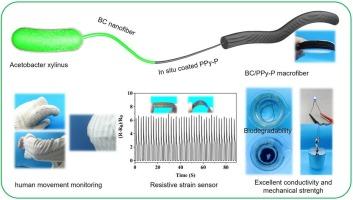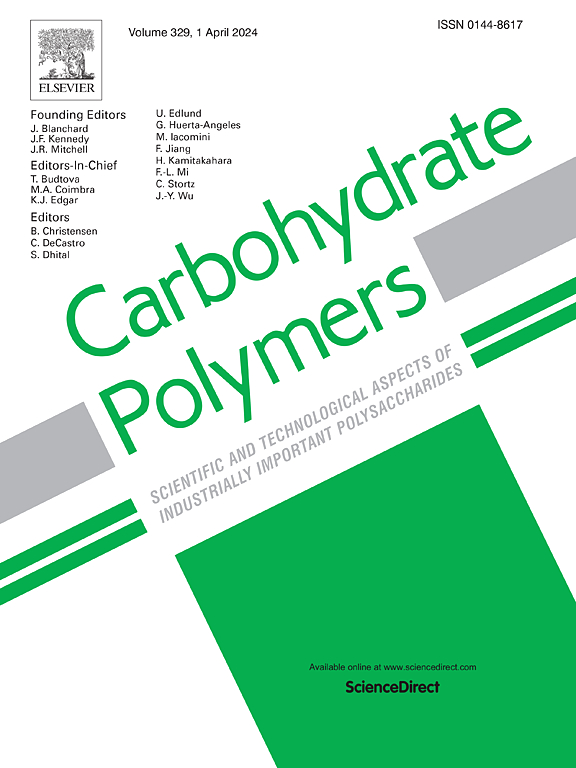可生物降解、坚固耐用且导电的细菌纤维素 @PPy-P 宏纤维作为智能纺织品的电阻应变传感器
IF 10.7
1区 化学
Q1 CHEMISTRY, APPLIED
引用次数: 0
摘要
纤维电阻式应变传感器因其便携性、灵活性和易适配性,在智能可穿戴设备的开发中引起了极大的兴趣。然而,目前主要由金属和不可降解聚合物组成的纤维电阻应变传感器并不环保,而且机械强度较差。在这项工作中,我们采用湿拉伸和湿扭转方法,研究了对甲苯磺酸(P-TSA)掺杂聚吡咯(PPy)在细菌纤维素(BC)纳米纤维中原位聚合而制成的可生物降解、坚固且导电的大纤维。BC/PPy-P大纤维具有优异的导电性(约7.19 S/cm)和机械性能(约210兆帕抗拉强度和2吉帕杨氏模量)。重要的是,用作电阻应变传感器的 BC/PPy-P 微纤维具有快速响应时间(15 秒)和长期稳定性(最多 1000 次循环),可用于有效检测人体运动。此外,BC/PPy-P 大纤维的基体材料 BC 在纤维素酶溶液中可在 96 小时内完全降解,只留下 PPy-P 颗粒,可回收再利用。因此,所制备的 BC/PPy-P 微纤维为开发绿色电阻应变传感纤维提供了一种前景广阔的策略,在设计用于监测人体运动的环保型智能织物方面具有巨大潜力。本文章由计算机程序翻译,如有差异,请以英文原文为准。

Biodegradable, robust, and conductive bacterial cellulose @PPy-P macrofibers as resistive strain sensors for smart textiles
Fiber-based resistive strain sensors have attracted significant interest in the development of smart wearable devices due to their portability, flexibility, and easy conformability. However, current fiber-based resistive strain sensors mainly composed of metals and nondegradable polymers are not environmentally friendly and have poor mechanical strength. In this work, we examined biodegradable, robust, and conductive macrofibers fabricated through the in situ polymerization of p-toluenesulfonic acid (P-TSA)-doped polypyrrole (PPy) in bacterial cellulose (BC) nanofibers using wet-stretching and wet-twisting methods. The BC/PPy-P macrofibers possessed excellent conductivity (~7.19 S/cm), with superior mechanical properties (~210 MPa tensile strength and 2 GPa Young's modulus). Importantly, the BC/PPy-P microfiber operating as a resistive strain sensor possessed fast response time (15 s) and long-term stability (up to 1000 cycles), which could be used to effectively detect human movements. Moreover, the matrix material BC of BC/PPy-P macrofibers could be completely degraded within 96 h in the cellulase solution, leaving only PPy-P particles that could be recycled for other use. Therefore, the prepared BC/PPy-P microfibers provided a promising strategy for developing green resistive strain sensing fibers, with great potential to design eco-friendly smart fabric for monitoring human movements.
求助全文
通过发布文献求助,成功后即可免费获取论文全文。
去求助
来源期刊

Carbohydrate Polymers
化学-高分子科学
CiteScore
22.40
自引率
8.00%
发文量
1286
审稿时长
47 days
期刊介绍:
Carbohydrate Polymers stands as a prominent journal in the glycoscience field, dedicated to exploring and harnessing the potential of polysaccharides with applications spanning bioenergy, bioplastics, biomaterials, biorefining, chemistry, drug delivery, food, health, nanotechnology, packaging, paper, pharmaceuticals, medicine, oil recovery, textiles, tissue engineering, wood, and various aspects of glycoscience.
The journal emphasizes the central role of well-characterized carbohydrate polymers, highlighting their significance as the primary focus rather than a peripheral topic. Each paper must prominently feature at least one named carbohydrate polymer, evident in both citation and title, with a commitment to innovative research that advances scientific knowledge.
 求助内容:
求助内容: 应助结果提醒方式:
应助结果提醒方式:


